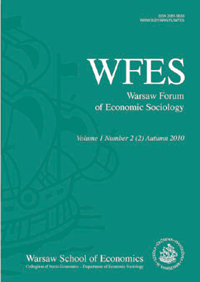Peripheral Convergence in the Crisis? Southern and Eastern European Labour Markets and Industrial Relations
Peripheral Convergence in the Crisis? Southern and Eastern European Labour Markets and Industrial Relations
Author(s): Guglielmo MeardiSubject(s): Sociology, Socio-Economic Research
Published by: Szkoła Główna Handlowa w Warszawie
Keywords: labour market; crisis; peripheral economies; austerity; employment flexibility
Summary/Abstract: In the study I exploit European Social Survey Round 5 data to identify the determinants of temporary employment in Poland. As in this country the share of employees working under contracts of limited duration is the highest among all European Union member states, identifying the determinants of temporary employment is important not only for individuals but also for the policy-makers. The results of the analysis are supplemented with an investigation of the determinants of temporary employment for people younger than 30 years old as this phenomenon is commonly associated with young employees.The paper explores the issue of progressing convergence of labour markets in two EU member states from the Southern (Italy and Spain) and Eastern (Poland) regions of the continent. After 2008 the series of crises hit the South particularly hard, which triggered profound labour market reforms. As a result Southern European countries have been facing growing flexibility and employment insecurity that had characterised Eastern Europe prior to the economic breakdown. On the other hand, the paper takes a look at Poland - which has avoided the worst consequences of the crisis - in an attempt to establish whether the country has moderated their neoliberal reforms, drawing on painful experiences of the South.
Journal: Warsaw Forum of Economic Sociology
- Issue Year: 5/2014
- Issue No: 1 (9)
- Page Range: 7-27
- Page Count: 21
- Language: English

